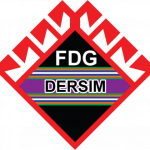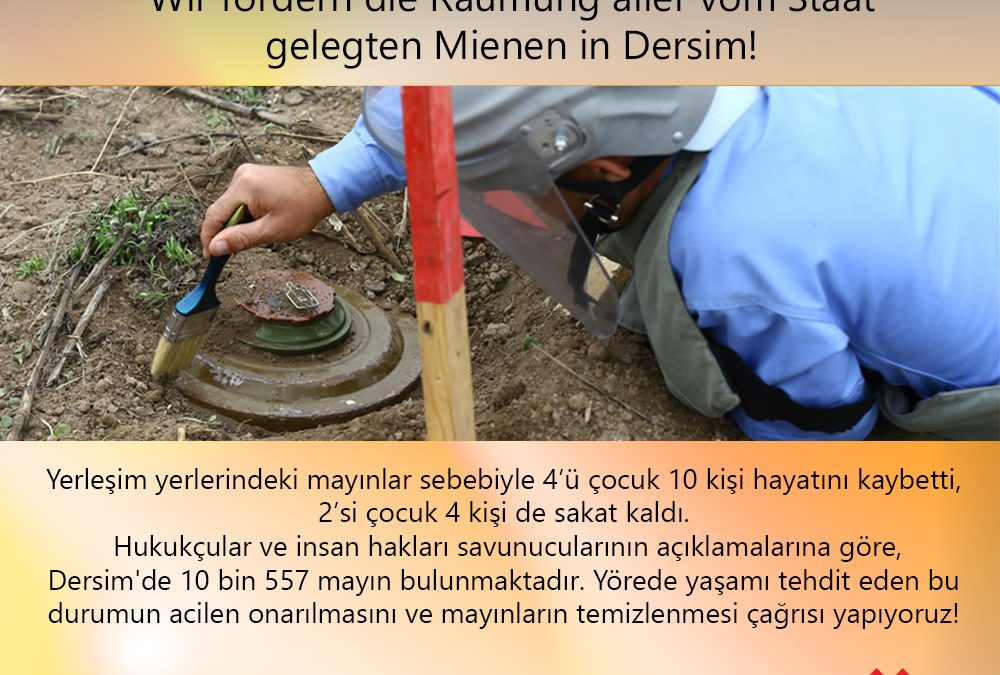
Dersim 1937-38 Oral History Project (DSTP) Duisburg 6.12.2024
Dersim 1937-38 Oral History Project (DSTP)
The reasons for the need for Dersim organizations in Turkey and Europe were not only the loss of the mother tongue, faith and other cultural values and the endangerment of Dersim’s geography. There was another factor that was just as important as these main cultural elements:
There is a “milestone” like “1938” and the question of “coming to terms with” the “ethnic and cultural massacre” of a people that took place on this date! For this reason, for the people of Dersim, there are two important events in the last century that come to mind when talking about “history” and that can be considered historical turning points:
The first is “1938”, the second is “1994”. These two “milestones” each represent an important turning point in the existence of the people who have lived in Dersim for centuries and the fundamental cultural elements of this existence…
This unique and independent Dersim organization, whose institutional name in Turkish is “Federation of Dersim Associations in Europe”, has initiated a historical “academic-scientific” study in this field, which we will discuss in this chapter.
This study is an institutional project of the FDG under the name “Dersim 1937-38 Oral History Project (DSTP)”. This institution and its work belong to the people of Dersim, and the reason why this project has reached a certain point and has been successful up to a certain point, and there are interviews with more than “three hundred and eighty” people, is that the people have wholeheartedly embraced this work and contributed to it financially and morally.
THE ORIGIN AND DEVELOPMENT OF THE PROJECT IDEA
“Initiatives and activities that formed the basis for this work before the start of the DST project”
In order for the reader to understand this process in its entirety, we think it is useful at this point to give a brief overview of the work that preceded and followed the Dersim 1937-38 Oral History Project, both before and after the founding of the FDG:
The most lasting and important result of these efforts is undoubtedly the “Dersim 1937-38 Oral History Project” (DSTP), which was launched on August 28, 2009 and completed its first phase in 2012.
The “first” steps of the DSTP
The first steps of the DSTP were taken on 12 and 14 September 2008 in Dortmund, Germany. In the meetings, which were attended by members of the FDG, academics and politicians, it was decided to establish a “Dersim Documentation and Archive Centre”.
In mid-2009, Dicle Akar from Dersim presented a concrete project for the “Documentation and Internationalisation of Dersim Tertelesi” to the Federation of European Dersim Associations (FDG).
The FDG accepted this project proposal as “feasible” and officially decided to initiate such a project.
On 7 June 2009, the urgency of this work was pointed out in the call for proposals for the 4th European Dersim Culture Festival, which also took place in Bonn.
The first practical step was taken with the opening of a stand under the motto “Stretch out your hand before the last witnesses pass away”.
The process of forming the DSTP committee
With the contributions and solidarity of the Dersim Friends, the Dersim and the Alevi communities, the “DSTP Committee” was founded at a meeting on August 28, 2009, which was attended by the FDG-YK, the Audit, Disciplinary and Faith Committee, the leaders of the associations and some personalities.
The DSTP committee was initially established as an “academic committee”. Filiz Aktaş, sociologist Mehmet Yıldız and educator Dicle Akar participated in this committee. A short time later, Dicle Akar established a relationship with Prof. Dr. Taner Akçam, a world-renowned lecturer in genocide at Clark University, and requested his support.
The process of forming the DSTP Committee
In this way, Mr. Akçam was also included in the “Academic Committee” of the project.
Prof. Leyla Neyzi from Sabancı University and Yaşar Kaya, the then chairman of the FDG, joined the committee.
In “March 2010”, Cemal Taş, in “June 2010” sociologist Assoc. Prof. Dr. Şükrü Aslan and lawyer Hüseyin Aygün from Mimar Sinan University joined the DSTP committee and actively participated in the work.
Unfortunately, some people in the DSTP Committee have “deinstitutionalized the work and put it in a personal dimension”, “have not complied with the rules and transparency in terms of accountability”, the individuals and entities authorised on behalf of the FDG and the DSTP have not fulfilled their responsibilities in a timely manner, and perhaps this negative situation has arisen for other reasons unknown to us.
“With this project (DSTP), the FDG wants to complete the oral interviews with the contemporary witnesses of 1938 in a first phase and in a second phase make these materials and products available to international researchers…”.
Dersim 37/38 Tertelesi oral historical documents were handed over to the Shoah Foundation.
Agreement with the Shoah Foundation
BERLIN – The documents of the oral history project of the European Dersim Association of Associations on Dersim Tertelesi*, which was launched in 2009, were handed over to the USC Shoah Foundation, which maintains archives on massacres and genocides, at a meeting held in Berlin on 17 November. The meeting was also attended by Cem Özdemir, SPD MP Sevim Aydın, Hakan Taş of the Left Party and the mayor of Berlin Kreuzberg, Clara Hermann.
The oral history study in question was carried out in collaboration between the Federation of European Dersim Associations and Clark University, and 360 interviews were conducted with survivors of the 1937-38 massacres living in eight different countries.
OPENING PRIZE CEM ÖZDEMİR HAD: IT IS NOT EASY TO COUNTER SUCH A CRIME
The opening speech was given by Cem Özdemir, Germany’s Minister of Agriculture. Özdemir thanked everyone who participated in this project and said: “It is not easy to be confronted with such a crime.
They worked for 15 years and made 360 video recordings both in Turkey and in the diaspora. I appreciate that with all my heart.“Özdemir also thanked Hasan Saltık, who made an important contribution to the work:” For the book Dersim Tertelesi, he spent 10 years researching, evaluating archives, collecting photos and reading the reports of eyewitnesses.
Özdemir continued in his speech: “In 2005 I was personally in Dersim. I have seen the impressive wealth of this region. mountains and rivers such as Munzur, Fırat, Kızılırmak; Languages such as Kurmançi, Zaza, Turkish, Armenian; Religions and beliefs such as Alevis, Sunnis, Christianity.
But the history of suffering and state oppression in Dersim is just as long. If we fight for an open and democratic society, for a future without pogroms, massacres and genocides, we need an energetic civil society. The European Dersim Association and the USC Shoah Foundation are excellent examples of this.”
KARABULUT: A TURNING POINT FOR DEMOCRACY
Kemal Karabulut, the 2nd President of the Federation of European Dersim Associations, explained in his speech that the children of those who witnessed the Dersim massacre had grown up in a devastating silence for years.
“Despite the indescribable pain, we will not seek blood and revenge.” The demands of the people of Dersim are modest, rational and easy to meet,” Karabulut said, adding: “Instead of dealing with Dersim Tertelesi with a simple approach such as assessing from the perspective of a particular political ideology, this is the case.”
“It’s about feeling responsible.” “The ceremonial handover of these oral meeting minutes to the SHOAH FOUNDATION, the world’s largest visual archive, can also be seen as a turning point in the history of democracy in Turkey.”
HOW DID WE GET TO THIS STAGE?
Dicle Akar and Hasan Dursun, spokespersons for the Dersim Tertelesi Oral History Project, stated that for the study, which they initiated as children and grandchildren of the victims of the massacre for two years, up to 700 hours of recording were made with 350 victims in 8 different countries after the massacre of 1938
In addition to many volunteers, Prof. Dr. Taner Akçam, Prof. Deborah Dwork, Prof. Martin van Bruinessen, Prof. They announced that the Scientific Advisory Board, consisting of Hans Lukas Kieser and Karen Jungblut, had pledged their support.
SHOAH FOUNDATION COLLECTS MASSACRE AND GENOCIDE DOCUMENTS
The deputy director of the USC Shoah Foundation, Dr., attended the meeting. Kori Street began her speech by saying, “I am honored and pleased to announce to the public today the partnership between the USC Shoah Foundation and the Federation of European Dersim Associations.”
Citing that the foundation was established in 1994 after the production of the film “Sindler’s List,” Dr. K. Street said that the foundation was established to record the accounts of survivors and witnesses of the genocide, preserve them forever, and keep those memories alive through education and research.
Dr. said that he was honored to receive the interviews provided by the Dersim Federation to the USC Shoah Foundation. “These compelling testimonies, along with 55,000 other witness interviews, will be preserved, digitized and indexed in our visual history archive to make them accessible worldwide,” Street said.
WHAT IS TERTELE?
Just as the people of Dersim define the natural disaster, the earthquake, as an “earthquake”, they also define the massacre of 1937/38, i.e. the social catastrophe they experienced, as “tertele”.
While Tertele was long defined as a massacre/massacre, Dersim institutions, especially the FDG (European Dersim Federation), were content with this definition of genocide and conceptualized it as “Tertele”.
Evaluation of the event
• “Dersim 1937–1938: Oral History Project” on 06.12.2024 in Duisburg
• As part of the Kiriv 4.0 project of the BDAJ-NRW e.V., a joint information event took place on 6 December 2024 with the Dersim Gemeinde Westfalia e.V. and the Zentrum für Kultur Hochfeld (SGDV e.V.). The event was held in the premises of the Suryoye Ruhrgebiet e.V., which were rented for the occasion and designed with the support of the association.
• The central theme of the evening was “Dersim 1937–1938: Oral History Project- DSTP”. Mr. Ismail Yüceer from the Federation of Dersim Communities (FDG) was invited as a speaker. The event began shortly after 6 p.m. with a lecture by the speaker. First, Mr. Yüceer gave a chronological overview of the Dersim genocide from 1926 onwards. He presented chronological information on the events in Dersim and highlighted the reports that were written after the founding of the Republic of Turkey. He then explained the activities of the Federation of Dersim Communities in Europe (FDG), which pave the way for the Dersim Trauma Project (DSTP) and contribute significantly to it.
• In the further course of the evening, he devoted himself in detail to the actual topic of the evening: the oral history project “Dersim 1937–1938”. The event met with great interest. More than 40 participants listened attentively to the lecture and then took the opportunity to ask the speaker numerous questions. The lively discussions underlined the relevance of the topic and the broad interest in the historical reappraisal of these events. The active participation of many young participants was particularly pleasing. A young political scientist from the Demenan tribe, for example, called for the start of the second phase of the oral history project, as he knew many contemporary witnesses in his environment who could provide valuable reports on the genocide in Dersim.
• The evening ended with an open exchange that offered space for reflection and further discussions. This event made an important contribution to the culture of remembrance and promoted intergenerational dialogue. We hope that the Federation of Dersim Municipalities in Europe and the Dersim Municipality of Westfalia will be able to work together again in the future with the Kiriv “Kiriv 5.0” project.
• We would like to thank all participants and organizations who supported us.
• Dersim Gemeinde Westfalia e.V.












